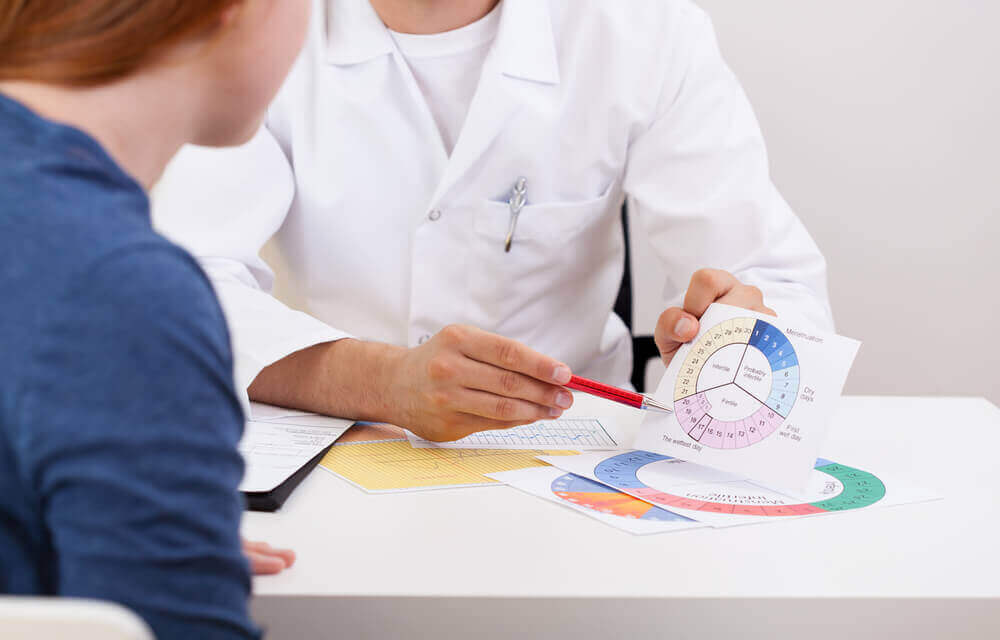Irregular Menstrual Cycles: Causes, Signs and Treatment

Irregular menstrual cycles can occur as a result of various factors, both physical and emotional. Although these factors all occur at different levels of intensity, their presence does affect our health. The most obvious examples are breastfeeding and the run-up to menopause.
Regardless of what causes them, irregular menstrual cycles are a cause for concern because we see them as an indication that our health is at risk. Although this isn’t always the case, it’s good to pay attention to the signs our body gives us. Of course, the person who ultimately determines our state of health should be a doctor.
When does a menstrual cycle become classified as irregular?
If you have a gap of fewer than 21 days between periods, this is known as “polymenorrhea.” If you have a gap of more than 35 days between periods, this is known as “oligomenorrhea.” Both of these are classified as irregular, given that, in the majority of women, a regular menstrual cycle is between 21 and 35 days long. Very few are exactly 28 days long.
If a period lasts more than 7 days and has a volume of over 80ml, this can also be classified as an irregularity. In these cases, you should visit a gynecologist, who will carry out a complete evaluation and prescribe a treatment, if required.

When is there greater irregularity?
If we go by the most basic rule of regular periods, then over two years, most women’s menstrual cycle would be considered as irregular. Irregular periods also occur in the 3 years leading up to menopause.
This is because, during this time, between 6% and 34% of women experience anovulation, which is a hormonal imbalance that impedes the release of mature eggs.
Causes of irregular menstrual cycles
Hormone imbalances are very common during adolescence and before menopause. In some women, it can cause irregularities in their menstrual cycle.
Generally, psychosomatic disorders cause the most imbalances in our bodies. Therefore, stress and anxiety are some of the biggest causes of irregular periods, and even of temporary pauses in menstruation. On a physical level, poorly functioning thyroids can also cause irregularities.
In other cases, irregularities in menstrual cycles can be caused by a disruption to ovulation known as: polycystic ovaries.
Diabetes and eating disorders such as bulimia and anorexia cause irregularities. A dramatic increase or loss in weight in a short period of time can also cause irregularities.
Adolescence and menstrual irregularities
There are young women whose menstrual cycles are as regular as clockwork. However, there are also women whose periods arrive at a different time every month, they might even have a month where their period doesn’t arrive at all.
It’s also possible to have two periods in one month. It’s important to point out that this isn’t cause for concern, as long as your periods arrive within 21-30 days of each other.
In terms of how many days a period should last, it can change every month. Generally, it only lasts between 2 days and a week. This is due to the fact that your body’s hormonal concentration, which affects the duration and quantity of bleeding, varies each month.
Breastfeeding and menstrual cycles
During breastfeeding, menstrual cycles vary from woman to woman. Some women’s periods are delayed by 4 or 5 months, sometimes even 12. Generally, this occurs when you’re breastfeeding exclusively and within 6 hours of your breastfeeding.
The production of milk inhibits the hormone responsible for menstruation. You shouldn’t let this worry you as it’s a natural process.
Signs
- Outbreaks of acne
- Mood swings
- Headaches
- Irritability and hypersensitivity
- Back pain and stiffness
- Irregular sleeping patterns
- Inflammation of the breasts (swelling and hardness)

Treatment
For irregular menstrual cycles, gynecologists treat every case individually. This treatment often includes contraceptives and nutritional supplements. These help to keep a hormonal balance and to regulate the menstrual cycle.
For irregular menstrual cycles caused by menopause and puberty, there is no medical treatment unless there is an underlying condition.
Advice
It’s important to get enough rest and to avoid stress. A good diet has a positive effect on your body and your mind. Taking part in physical activities like sports and exercise, as far as you are able to, is also very positive.
Maintain high levels of hygiene when you’re menstruating, and use treatment if a doctor has recommended it.
Having irregular menstrual cycles can be related to health problems. However, you can manage this by learning about your situation and following the relevant advice.
Once your menstrual cycle has become regular, you can use an ovulation calculator to find out roughly when your next period will be.
Irregular menstrual cycles can occur as a result of various factors, both physical and emotional. Although these factors all occur at different levels of intensity, their presence does affect our health. The most obvious examples are breastfeeding and the run-up to menopause.
Regardless of what causes them, irregular menstrual cycles are a cause for concern because we see them as an indication that our health is at risk. Although this isn’t always the case, it’s good to pay attention to the signs our body gives us. Of course, the person who ultimately determines our state of health should be a doctor.
When does a menstrual cycle become classified as irregular?
If you have a gap of fewer than 21 days between periods, this is known as “polymenorrhea.” If you have a gap of more than 35 days between periods, this is known as “oligomenorrhea.” Both of these are classified as irregular, given that, in the majority of women, a regular menstrual cycle is between 21 and 35 days long. Very few are exactly 28 days long.
If a period lasts more than 7 days and has a volume of over 80ml, this can also be classified as an irregularity. In these cases, you should visit a gynecologist, who will carry out a complete evaluation and prescribe a treatment, if required.

When is there greater irregularity?
If we go by the most basic rule of regular periods, then over two years, most women’s menstrual cycle would be considered as irregular. Irregular periods also occur in the 3 years leading up to menopause.
This is because, during this time, between 6% and 34% of women experience anovulation, which is a hormonal imbalance that impedes the release of mature eggs.
Causes of irregular menstrual cycles
Hormone imbalances are very common during adolescence and before menopause. In some women, it can cause irregularities in their menstrual cycle.
Generally, psychosomatic disorders cause the most imbalances in our bodies. Therefore, stress and anxiety are some of the biggest causes of irregular periods, and even of temporary pauses in menstruation. On a physical level, poorly functioning thyroids can also cause irregularities.
In other cases, irregularities in menstrual cycles can be caused by a disruption to ovulation known as: polycystic ovaries.
Diabetes and eating disorders such as bulimia and anorexia cause irregularities. A dramatic increase or loss in weight in a short period of time can also cause irregularities.
Adolescence and menstrual irregularities
There are young women whose menstrual cycles are as regular as clockwork. However, there are also women whose periods arrive at a different time every month, they might even have a month where their period doesn’t arrive at all.
It’s also possible to have two periods in one month. It’s important to point out that this isn’t cause for concern, as long as your periods arrive within 21-30 days of each other.
In terms of how many days a period should last, it can change every month. Generally, it only lasts between 2 days and a week. This is due to the fact that your body’s hormonal concentration, which affects the duration and quantity of bleeding, varies each month.
Breastfeeding and menstrual cycles
During breastfeeding, menstrual cycles vary from woman to woman. Some women’s periods are delayed by 4 or 5 months, sometimes even 12. Generally, this occurs when you’re breastfeeding exclusively and within 6 hours of your breastfeeding.
The production of milk inhibits the hormone responsible for menstruation. You shouldn’t let this worry you as it’s a natural process.
Signs
- Outbreaks of acne
- Mood swings
- Headaches
- Irritability and hypersensitivity
- Back pain and stiffness
- Irregular sleeping patterns
- Inflammation of the breasts (swelling and hardness)

Treatment
For irregular menstrual cycles, gynecologists treat every case individually. This treatment often includes contraceptives and nutritional supplements. These help to keep a hormonal balance and to regulate the menstrual cycle.
For irregular menstrual cycles caused by menopause and puberty, there is no medical treatment unless there is an underlying condition.
Advice
It’s important to get enough rest and to avoid stress. A good diet has a positive effect on your body and your mind. Taking part in physical activities like sports and exercise, as far as you are able to, is also very positive.
Maintain high levels of hygiene when you’re menstruating, and use treatment if a doctor has recommended it.
Having irregular menstrual cycles can be related to health problems. However, you can manage this by learning about your situation and following the relevant advice.
Once your menstrual cycle has become regular, you can use an ovulation calculator to find out roughly when your next period will be.
This text is provided for informational purposes only and does not replace consultation with a professional. If in doubt, consult your specialist.








